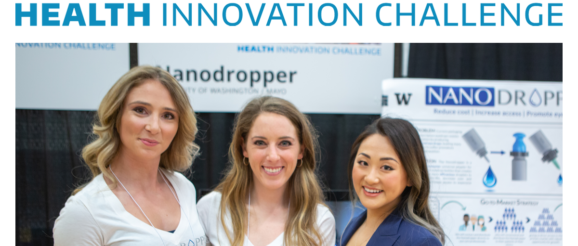Health Innovation Challenge Finalists Selected From Record Pool

The fifth annual Hollomon Health Innovation Challenge (HIC) at the University of Washington kicked off bigger than ever! During the Screening Round, 85 judges reviewed a record 51 student entries from teams representing eight colleges and universities across the Cascadia Corridor—including Washington, Oregon, Idaho, and British Columbia.
The 21 finalist teams (detailed below) were selected to compete March 5 at the live event hosted by the UW Foster School’s Buerk Center for Entrepreneurship. The finalist teams represent five different colleges and universities, including UW, Washington State University, University of Idaho, and University of British Columbia. UW teams participating in the HIC feature graduate and undergraduate students representing more than a dozen majors, programs, and departments across the Seattle and Bothell campuses.
Good luck to the 2020 competitors!
ApnoMed
ApnoMed is a developer of patented and FDA cleared medical and dental devices used for the prevention, management, and treatment of obstructive sleep apnea.
- University of Washington-Seattle (MS in Entrepreneurship)
Arogya
A low-cost, electricity-free, water-saving washing machine and dryer which provides women with a discrete and culturally acceptable way to clean small cloth items like sanitary napkins while reducing transmission of water-borne and blood-borne diseases.
- University of Washington-Seattle (Bioengineering, Psychology)
BacTrac
Our rapid and modular diagnostic device allows for the early detection of an infected wound by targeting S. aureus, one of the most common pathogens found in wounds, and can be modified to fit the needs of the end user.
- University of Washington-Seattle (Bioengineering)
CatheterX
CatheterX’s mission is to design, test, and license a multi-channeled spiral-designed urinary catheter that will save thousands of lives from infections each year while reducing costs for hospitals.
- University of Idaho (Accounting, Marketing)
Concentric
A portable, low-cost device for screening for corneal disease.
- University of Washington-Seattle (Applied Bioengineering)
C-O-You
A way to reduce wiring of capnography technology in the pre-hospital setting in order to monitor the overall perfusion and ventilation of the patient with minimal physical obtrusion leading to less complications with intubation and ventilation.
- University of Washington-Seattle (Chemical Engineering, Human Centered Design and Engineering, Mechanical Engineering, Electrical Engineering)
CREST Urethral Catheter Simulator
To tackle the problem of unrealistic urethral catheter simulation trainers, we created a hyper-bio realistic, patient-specific male urethral catheter simulator for use in the improved training of healthcare providers at all skill levels.
- University of Washington-Seattle (Bioengineering)
Dentomimetix
The unique value proposition of Dentomimetix is that we developed additive and sensitivity-free re-mineralizing whitening lozenges to provide a healthier alternative to the existing abrasive teeth whiteners.
- University of Washington-Seattle (Materials Science and Engineering, Biology)
ElectroSolar Oxygen
Our goal is to make a mid-sized, sustainable oxygen concentrator that can be deployed in underdeveloped nations or in areas affected by natural disasters.
- University of Washington-Seattle (Chemical Engineering)
GlideAssist
Medical device that will aid in placing endotracheal tubes (ETT) into infant airways that may be inaccessible with current technology.
- University of Washington-Seattle (Bioengineering, MBA)
GoVac
We are developing a small, wearable pump that can perform negative pressure wound therapy on wounds to improve quality of care for people using wound vacs.
- University of Washington-Seattle (Bioengineering)
h2neo
Economically conscious, precise intravenous fluid delivery for the prevention and treatment of neonatal dehydration in resource-limited settings.
- University of Washington-Seattle (Mechanical Engineering, Electrical & Computer Engineering)
Insucon
A way to determine incorrect insulin administration in insulin pen users to improve blood glucose management and reduce rates of hyperglycemia, hypoglycemia, and associated hospitalizations.
- University of Washington-Seattle (Mechanical Engineering, Chemical Engineering and Biochemistry, Medical Technology & Control Systems)
Insulin Anywhere
Insulin Anywhere is developing a portable, standalone device that provides everything needed for a diabetic to safely treat themselves with insulin injections for 7-10 days.
- University of Washington-Seattle (Bioengineering)
Onboard Pump Solutions
The team is developing an everting laryngeal mask airway device to assist in emergency endotracheal intubation.
- University of Washington-Seattle (Mechanical Engineering)
RestNest
Addresses a problem for patients undergoing an MRI scan in which excessive movement by the patient compromises the imaging quality and requires a repeat of the imaging sequence.
- University of Washington-Seattle (Applied Bioengineering)
Robotics Rehabilitation
A semi-autonomous robot that addresses the tedious nature of (upper body) stroke rehabilitation to make the recovery process more enjoyable and engaging for a patient through a gamify interface.
- University of Washington-Bothell (Mechanical Engineering)
SleepAssist
A way to address the discomfort and lack of effective treatment in patients with mild to moderate obstructive sleep apnea (OSA) who fail to adhere to positive airway pressure (PAP) therapy to improve their quality of sleep and life.
- University of Washington-Seattle (Mechanical Engineering, Electrical Engineering)
Smart Soles
Falling, in the senior demographic, is the leading cause of death from injury. Smart Soles uses weight distribution sensors and machine learning to improve senior balance and reduce the likelihood of falling.
- University of British Columbia (Entrepreneurship and International Business, Computer Science, Mechatronics, Computer Engineering, Psychology)
Spira
State-of-the-art machine learning applied to respiratory disease screening.
- University of Washington-Seattle (Computer Science)
Zephyr
Zephyr Mattress ensures that people suffering from muscular dystrophy receive the benefits of a full night of restful sleep in the comfort of their own homes through the integration of a pressure sensitive oscillating vesicle mattress and bed frame.
- Washington State University (Bioengineering)
Alternates
Exact Biotechnologies
Bi-directional control of gene expression for next-generation immunotherapies.
- University of Washington-Seattle (Psychology, Immunology)
NeuroNav
NeuroNav, in conjuction with traditional medicine, is a breakthrough virtual reality technology that helps empower individuals to be active participants in their healing processes.
- University of Idaho (Accounting, Art and Architecture)
The post Health Innovation Challenge Finalists Selected From Record Pool appeared first on Foster Blog.
